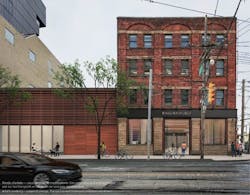Government of Ontario breaks ground on three Ontario Line stations
The government of Ontario has broken ground on King-Bathurst, Queen-Spadina and Moss Park stations, marking another milestone in the province’s plan to build the Ontario Line and create a reliable and continuous transit line that connects communities throughout the Greater Toronto Area (GTA).
“Under the leadership of Premier Ford, our government is one step closer to delivering a world-class transit system for the GTA,” said Ontario Minister of Transportation Prabmeet Sarkaria. “The stations we’re breaking ground on today will help tackle gridlock, reduce commute times and connect thousands of commuters to homes and good-paying jobs each and every day.”
Construction at the three sites includes work to remove soil and bedrock to create 30- to 40-meter (98.4- to 131.2-foot) deep stations with elevators and escalators that will connect the subways to the street. The work will also prepare for future tunnel boring machines to create the tunnels that will connect all the underground stations through the downtown segment of the Ontario Line.
“A strong public transit system will help folks in Toronto get where they need to go faster and reliably. That’s why, in 2021 we announced over C$4 billion (US$3 billion) in support for the Ontario Line,” said Sean Fraser, Canada’s minister of housing, infrastructure and communities. “With the launch of Canada Public Transit Fund in July, we are investing nearly C$30 billion (US$22.2 billion) over the next 10 years for transit projects across the country. The ground-breaking of the King-Bathurst, Queen-Spadina and Moss Park stations is an important milestone in our work to build a stronger public transportation system across the Greater Toronto Area.”
The King-Bathurst Station will serve more than 5,000 commuters during the morning rush hour, creating crucial connections between the Ontario Line and popular streetcar routes like 504 King and 511 Bathurst. The Queen-Spadina and Moss Park stations are expected to serve more than 7,000 commuters each and facilitate more than 5,000 transfers during the morning rush hour. The Ontario Line project will help reduce crowding on Line 1 (Yonge-University) by 15 percent and at Union Station by 14 percent.
Once complete, the 15.6-kilometer (9.7-mile) Ontario Line will have 15 stations, running from Exhibition Place through the downtown core and connecting to the Eglinton Crosstown Light Rail Transit. The line will offer more than 40 connections to other subway, bus, streetcar and regional train services, bringing 227,500 more people within walking distance of transit and reducing daily car trips by at least 28,000.
"Getting shovels in the ground at these future stations highlights the incredible progress our government is making towards delivering the largest subway expansion in our country’s history. We are not only building faster and more seamless transit, we’re also seizing this unique opportunity to create vibrant, mixed-use communities all along the Ontario Line. Our planned transit-oriented communities, such as at the future King-Bathurst and Queen-Spadina Stations, will bring more jobs, housing, including affordable units and retail closer to transit, strengthening the character and liveliness of Toronto’s downtown core,” said Ontario’s Minister of Infrastructure Kinga Surma.
"Starting excavation means we are making significant strides in bringing the Ontario Line to life and giving people more ways to take transit. These three stations alone will put subway service within walking distance for more than 70,000 downtown residents,” said Phil Verster, president and CEO of Metrolinx.







